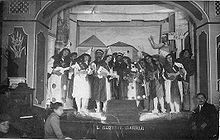- Play (theatre)
-
Performing arts Major formsMinor formsGenresDrama · Tragedy · Comedy · Tragicomedy · Romance · Satire · Epic · Lyric
Literature Major formsNovel · Poem · Drama
Short story · NovellaGenres Epic · Lyric · Drama
Romance · Satire
Tragedy · Comedy
TragicomedyMedia Performance (play) · Book
Techniques History and lists Outline of literature
Index of terms
History · Modern history
Books · Writers
Literary awards · Poetry awardsDiscussion A play is a form of literature written by a playwright, usually consisting of scripted dialogue between characters, intended for theatrical performance rather than just reading. There are rare dramatists, notably George Bernard Shaw, who have had little preference whether their plays were performed or read. The term "play" can refer to both the written works of playwrights and to their complete theatrical performance.[1]
Contents
Genres
Comedy
Comedies are plays which are designed to be humorous. Comedies are often filled with witty remarks, unusual characters, and strange circumstances. Certain comedies are geared toward different age groups. Comedies were one of the two original play types of Ancient Greece, along with tragedies. An examples of a comedy would be William Shakespeare's play "A Midsummer Night Dream," or for a more modern example the skits from "Saturday Night Live".[2][3]
Farce
A generally nonsensical genre of play, farces are often overacted and often involve slapstick humour. An example of a farce includes William Shakespeare's play "The Comedy of Errors," or Mark Twain's play "Is He Dead?"
Satirical
A satire is a play which takes a comic look at current events and famous people while at the same time attempting to make a political or social statement, for example pointing out governmental corruption. An example of a satire would be George Orwell novel "Animal Farm," or Jonathan Swift's book "Gulliver's Travels."[4]
Tragedy
These plays often involve death and are designed to cause the reader or viewer to feel sadness. Tragic plays convey all emotions, and have extremely dramatic conflicts. Tragedy was one of the two original play types of Ancient Greece. Some examples of tragedies include William Shakespeare's play "Romeo and Juliet," and also John Webster's play "The Duchess of Malfi."[2]
Historical
These plays focus on actual historical events. They can be tragedies or comedies, but are often neither of these. History as a separate genre was popularised by William Shakespeare. Examples of historicals include Leo Tolstoy's novel "War and Peace," and William Shakespeare's play "King John."[5]
Terminology
The term "play" can be either a general term, or more specifically refer to a non-musical play. Sometimes the term "straight play" is used in contrast to "musical", which refers to a play based on music, dance, and songs sung by the play's characters. For a short play, the term "playlet" is sometimes used.
See also
Lists
- List of basic theatre topics
- List of Canadian plays
- List of films based on stage plays or musicals
- List of plays made into feature films
Related topics
- Closet drama
- Drama
- Dramatis personæ
- Playwright
- Theatre
- History of theatre
- Screenplay
- Musical theatre
References
- ^ "Play": Dictionary.com website. Retrieved on January 3, 2008.
- ^ a b "THE ANCIENT GREEK DRAMA & THEATRE HISTORY PAGE". anarchon.tripod.com. http://anarchon.tripod.com/indexGREEKTH.html. Retrieved 2008-06-16.
- ^ "Origin of Comedy". www.theatrehistory.com. http://www.theatrehistory.com/ancient/bates001.html. Retrieved 2008-06-16.
- ^ "satire - Definitions from Dictionary.com". dictionary.reference.com. http://dictionary.reference.com/browse/satire. Retrieved 2008-06-16.
- ^ The Three Richards: Richard I ... - Google Book Search. books.google.co.uk. 2006. ISBN 9781852855215. http://books.google.com/?id=V3b2tlWBBUsC&pg=PA11&lpg=PA11&dq=%22Shakespeare+popularised%22+historical+play. Retrieved 2008-06-17.
Narrative Character Plot Climax · Conflict · Dénouement · Dialogue · Dramatic structure · Exposition · Falling action · Plot device · Subplot · Trope-ClichéSetting Theme Style Diction · Figure of speech · Imagery · Literary technique · Narrative mode · Stylistic device · Suspension of disbelief · Symbolism · ToneForm Fable-Parable · Fabliaux · Fairy tale · Flash story · Folktale-Legend · Hypertext · Novel · Novella · Play · Poem · Screenplay · Short story · List of narrative formsGenre Adventure · Comic · Crime · Docufiction · Epistolary · Erotic · Faction · Fantasy · Historical · Horror · Magic realism · Mystery · Paranoid · Philosophical · Political · Romance · Saga · Satire · Science · Speculative · Superhero · Thriller · UrbanNarrator Alternating person · First-person · Second-person · Third-person · Third-person limited · Third-person objective · Third-person omniscient · Third-person subjective · Stream of consciousness · UnreliableTense Medium Related Categories:
Wikimedia Foundation. 2010.

